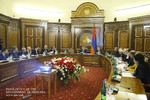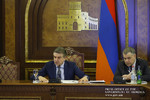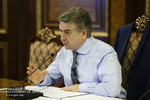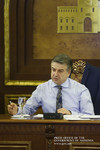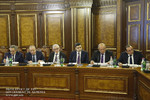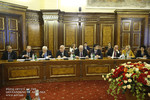Friday, 20 January 2017
PM instructs to submit strict program for sustainable management of groundwater resources in Ararat valley
Prime Minister Karen Karapetyan chaired a consultative meeting in the Office of Government to discuss issues regarding the use of underground water resources in Ararat Valley. Note that at the Cabinet meeting of December 15, 2016, the Prime Minister gave the Minister of Nature Protection one month to examine and draft a report on those business entities, which are using irrigation water without a permit in the Republic of Armenia, as well as make recommendations for elimination of illegal water use.
Minister Artsvik Minasyan reported that the observations made by the State Environmental Inspectorate and the statements issued by water users and water management bodies have shown that irregular activities are carried out by about 574 economic entities. The Prime Minister was informed on the amount of groundwater actually used in the Ararat valley (drinking, agricultural, industrial water and fisheries), overuse impact assessment, environmental situation, actual use of wells, as well as on water user permits and fisheries activities.
Referring to the consequences of overuse, RA Deputy Minister of Nature Protection Khachik Hakobyan noted that some 205 wells have stopped. in 2016 some groups of sources of Sevjur River headwaters have disappeared. As a result, the river feeds of Sevjur have significantly reduced. Akna Lake’s surface and natural exit has been reduced drastically. In 2013-2014 about 8,000 hectares of arable land in 29 communities were endangered. In 2014, more water was released from Lake Sevan than allowed by law. At the same time, in 2013-2014 additional spending was made from the State budget and other sources.
It was also noted that a series of measures have been carried out to eliminate illegal water use in Ararat valley. In particular, 56 deep-water artesian wells have been dissolved, 63 - conserved and 330 - brought to valve regime in Ararat valley since 2014, resulting in water savings amounted to 28808.8 l / s or 908.5 million cubic meters per year.
The speakers came up with recommendations for sustainable management of water resources, concerning, in particular, the use of water-saving and energy-saving technologies, the implementation of legislative, institutional and field activities, the suspension of new permits, the closure of abandoned wells, the application of a control system and so on.
Stressing the need to improve the environmental situation through effective steps aimed at ensuring efficient use of water resources, the Premier instructed to set up task force consisting of representatives of concerned departments.
“You must develop a very tough and accurate action plan, estimating the limit that should be allowed for fish breeding. You have to make approbation with creditworthy entities involved in the fish business. Theft must be ruled out. I want to make sure that we do not create artificial barriers for businesses; we are entitled to do so not only on behalf of the owner of the resource, but also in terms of logic and morality. As regards the tariffs, if the reported figures are correct, then we will have to set reasonably stricter tariffs. From now on, all those responsible shall strictly abide by their duties,” Karen Karapetyan concluded.







